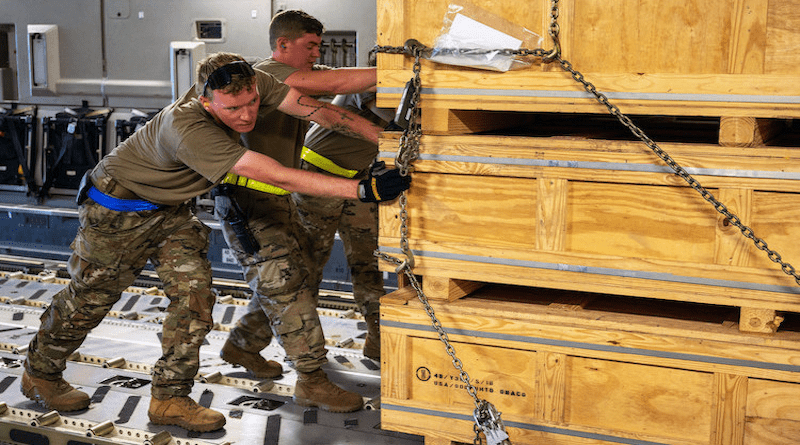What’s Next After Banned Cluster Bombs To Ukraine? – OpEd
By IDN
By Ramesh Jaura
“Have you noticed,” said John, “how countries call theirs ‘sovereign nuclear deterrents,’ but call the other countries’ ones ‘weapons of mass destruction’?” I am reminded of this quote from David Mitchell’s ‘Ghostwritten’ while reading how President Biden has defended his decision to provide Ukraine with banned cluster munitions, bypassing the US law and violating the international ban signed by his NATO allies.
Ahead of the NATO summit on 11-12 July in Vilnius, Lithuania, Mr Biden said, “the Ukrainians are running out of ammunition” in the fight against Russian forces, and that it was a temporary move to hold Ukraine over until the production of conventional artillery rounds could be ramped up.
“It was a very difficult decision on my part—and by the way, I discussed this with our allies, I discussed this with our friends up on the Hill,” the US President said in an interview with CNN. “The Ukrainians are running out of ammunition,” reported the Washington Post.
“And so, what I finally did, I took the recommendation of the Defense Department to—not permanently—but to allow for this transition period,” he added.
NATO Secretary-General Jens Stoltenberg dodged a question on whether he believed it was wise for the United States to provide the weapons to Ukraine. “It is for individual allies to make decisions on the delivery of weapons and military supplies to Ukraine,” Mr Stoltenberg told journalists at NATO’s headquarters in Brussels. “So this will be for governments to decide—not for NATO as an alliance.”
The Washington Post added: “Russia, US officials have noted, has been using its cluster munitions in Ukraine for much of the war. The Ukrainians have also used them, and President Volodymyr Zelensky has been pressing Mr Biden to supply him with more in order to flush out the Russians who are dug into trenches and blocking Ukraine’s counteroffensive.”
BBC asked the British Prime Minister about his position on the US decision. Rishi Sunak highlighted the UK was one of 123 countries that had signed up to the Convention on Cluster Munitions, which prohibits the production or use of cluster munitions and discourages their use.
Spain’s Defence Minister Margarita Robles told reporters her country had a “firm commitment” that certain weapons and bombs could not be sent to Ukraine. “No to cluster bombs and yes to the legitimate defence of Ukraine, which we understand should not be carried out with cluster bombs,” she said.
But Germany, which is also a signatory of the treaty, said that while it would not provide such weapons to Ukraine, it understood the American position.
“We’re certain that our US friends didn’t take the decision about supplying such ammunition lightly,” German government spokesman Steffen Hebestreit told reporters in Berlin.
A story published in IDN on 6 July quoting President Biden is “under steady pressure from Ukraine’s President Volodymyr Zelensky” to transfer banned cluster munitions, arguing that the munitions were “the best way to kill Russians who are dug into trenches and blocking Ukraine’s counteroffensive”.
Responding, the independent, nongovernmental Arms Control Association (ACA), said if he decides to give cluster munition, the US will be violating the Convention on Cluster Munitions–
Cluster munitions are designed to disperse or release explosive submunitions, each of which weighs less than 20 kilograms, and includes those explosive submunitions.
The US stockpile includes dual-purpose improved conventional munitions (DPICMs), surface-to-surface warheads, and other types of older cluster munitions.
Given that cluster munitions disperse hundreds or even thousands of tiny but deadly bomblets, their use produces significant quantities of unexploded submunitions that can maim, injure, or kill civilians and friendly forces during, and long after, a conflict.
“Some types of lethal US and European military assistance to Ukraine, including cluster munitions, would be escalatory, counterproductive, and only further increase the dangers to civilians caught in combat zones and those who will, someday, return to their cities, towns, and farms,” warned Arms Control Association’s Executive Director Daryl G. Kimball.
US National Security Advisor Jake Sullivan has been reported saying that Ukraine has given “written assurances” that it would not use these cluster munitions on foreign soil, but to defend its territory, preserve its civilian population as much as possible. Le Monde’s US correspondent Piotr Smolar noted that a paper guarantee is of “relative value”. He added: How will this be determined, with such indiscriminate bombs?”
“Ukraine has also committed to mine clearing efforts once the conflict ends to further minimize the potential impact of the rounds on civilians,” says US Department of Defence (DOD) News. Ukraine has also committed to mine clearing efforts once the conflict ends to further minimize the potential impact of the rounds on civilians. “The US has provided more than $95 million in assistance for Ukraine’s demining efforts.”
The Biden administration has committed more than $41.3 billion in security assistance—weapons—to Ukraine since the beginning of Russia’s invasion in February 2022. For the past year and a half, President Biden has been clear that we will support Ukraine for “as long as it takes”. Germany has also pledged to support Ukraine for “as long as it takes”.
The US and its NATO allies have assured that, while they will provide all the military equipment to facilitate Ukraine to stand up against Russia (and liberate its territory from Russian occupation?) but do everything possible to avoid the “NATO involvement” in the war.
What if Ukraine cannot retake its territories and the only way left is for some NATO countries’ armed troops to replenish Ukraine’s dwindling strength?
Ramesh Jaura is Editor-in-Chief of IDN, the flagship agency of the Non-profit International Press Syndicate.

